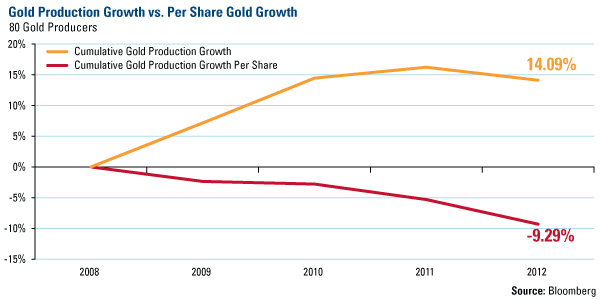Everybody has some gold jewelry laying around the house. For most people, that is all the gold investing they do. However, when a person does decide to invest in gold, they usually buy it like they normally buy stock, i.e., in shares of a company that mines gold. That has not been a good investment over the last few years. Take a look at this graph:


While the amount of gold taken out of the ground has actually increased 14% over the last four years on a cumulative basis, the amount of gold mined on a per share basis has decreased 9%.
More gold produced partially explains the recent weakness in gold prices, as increased supply of most anything weakens the price.
To finance greater production of gold, which is expensive, gold mining companies issued many new shares of stock, which has diluted the value of shares of stock, just as increased supply of gold stock weakens the price of gold stock.
The same supply & demand relationship works for the price of the raw gold and the number of dollars. If the supply of dollars increases faster than the supply of gold increases, the price of gold will normally increase. Monetarist economists like to say “too many dollars chasing too few goods chases up the price of those goods.”
It is a real historical anomaly that quantitative easing by the Fed has not increased the money supply enough to drive gold prices through the ceiling. It has not, because consumers have not been spending the newly-created money. (That is called the “velocity of money” and measures how often a dollar is spent.) As people lose the investment fear they’ve acquired since 2008, I expect money supply to increase significantly, and the price of gold to increase.
If the recent flood of money back into stock mutual funds (which is driving the market up right now) continues, then I expect the velocity of money to increase as well. That would be a good time to be owning gold — the metal and probably even the stock of companies digging it up.
